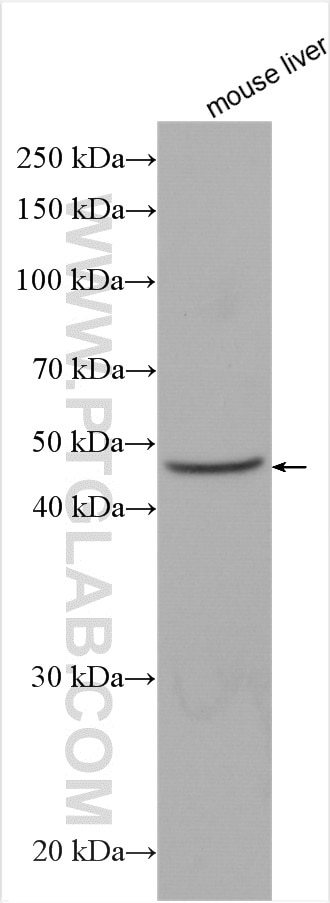Tested Applications
| Positive WB detected in | mouse liver tissue |
Recommended dilution
| Application | Dilution |
|---|---|
| Western Blot (WB) | WB : 1:500-1:1000 |
| It is recommended that this reagent should be titrated in each testing system to obtain optimal results. | |
| Sample-dependent, Check data in validation data gallery. | |
Product Information
15239-1-AP targets SMPD2 in WB, ELISA applications and shows reactivity with human, mouse samples.
| Tested Reactivity | human, mouse |
| Host / Isotype | Rabbit / IgG |
| Class | Polyclonal |
| Type | Antibody |
| Immunogen | SMPD2 fusion protein Ag7367 Predict reactive species |
| Full Name | sphingomyelin phosphodiesterase 2, neutral membrane (neutral sphingomyelinase) |
| Calculated Molecular Weight | 48 kDa |
| Observed Molecular Weight | 48 kDa |
| GenBank Accession Number | BC000038 |
| Gene Symbol | SMPD2 |
| Gene ID (NCBI) | 6610 |
| RRID | AB_3085456 |
| Conjugate | Unconjugated |
| Form | Liquid |
| Purification Method | Antigen affinity purification |
| UNIPROT ID | O60906 |
| Storage Buffer | PBS with 0.02% sodium azide and 50% glycerol , pH 7.3 |
| Storage Conditions | Store at -20°C. Stable for one year after shipment. Aliquoting is unnecessary for -20oC storage. 20ul sizes contain 0.1% BSA. |
Background Information
SMPD2, Sphingomyelin phosphodiesterase 2, is also named as Lyso-platelet-activating factor-phospholipase C and neutral sphingomyelinase (nSMase). It is involved in the sphingolipid metabolism pathway, which can catalyze the hydrolysis of sphingomyelin to form ceramide and phosphocholine. Smpd2/Smpd3 double-mutant mice were found to have severe retardation of late embryonic and postnatal growth and delayed puberty, belonging to hypothalamus-induced combined pituitary hormone deficiency (PubMed: 15764706).
Protocols
| Product Specific Protocols | |
|---|---|
| WB protocol for SMPD2 antibody 15239-1-AP | Download protocol |
| Standard Protocols | |
|---|---|
| Click here to view our Standard Protocols |



